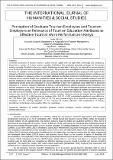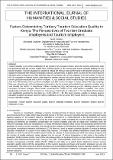Perception of Graduate Tourism Employees and Tourism Employers on Relevance of Tourism Education Attributes to Effective Tourism Work Performance in Kenya

View/
Publication Date
2019Author
Janet Kimeto, Wycliffe H Odiwuor, Oscar O Kambona
Metadata
Show full item recordAbstract/
Continued sustenance of tourism industry requires human capital with the right skills, knowledge and competency.
Kenya has a number of tertiary tourism education institutions that graduates potential employees for the tourism
industry annually. Despite this, there is a need to link the tourism education training to the needs of the tourism industry
so as to meet the needs and expectations of the industry. Many studies have investigated on this topical area of interest
but have not exploited on the perception of tourism graduate employees and the tourism employers with regard to the
relevancy of tourism education attributes. This study aimed at identifying perception of graduate tourism employees and
tourism employers on relevance of tourism education attributes to effective tourism work performance in Kenya. A cross
sectional survey research design was employed to collect data from 385 tertiary tourism graduate employees and 385
tourism employers in Kenya using multi-stage sampling. Data was collected using self-administered questionnaires. An
independent-sample t-test was conducted in SPSS to determine if there were significant mean difference in perceived
relevance of 17 tourism education attributes to effective work performance between graduate tourism employees and
tourism employers in the Kenya. The results indicate that all the 17 tourism education attributes were perceived to be
relevant by the two groups. The results also, largely, indicate that relevancy perception of tourism education attributes
was high among the tertiary tourism graduate employees than among tourism employers. ‘Teaching methodology’ for
instance was perceived to be the most relevant tourism education attributes among the tertiary tourism graduate
employees (M = 4.41, SD = .89) than tourism employers (M = 3.41, SD = 1.09), a statistically significant mean difference,
M = 1.00, 95% CI [.86, 1.14], t(736.15) = 13.91, p < .01. The study provides insights to tertiary tourism education program
developers and the training institutions on the relevancy of tourism education and considerations of industry
practitioners in the design and evaluation of tourism curriculum.
Collections
- Department of ECOHIM [58]
Related items
Showing items related by title, author, creator and subject.
-
Factors Determining Tertiary Tourism Education Quality in Kenya: The Perspectives of Tourism Graduate Employees and Tourism Employers
Janet Kimeto, Oscar O Kambona, Wycliffe H Odiwuor (THE INTERNATIONAL JOURNAL OF HUMANITIES & SOCIAL STUDIES, 2019)Tourism industry is one of the contributors to the growth of the Kenyan economy. Given its economic importance, both the government and the private sectors have invested heavily in the training and human capacity building ... -
Moderating effect of tourism business networks on tourism backward linkage with local micro and small enterprises in Kisumu County.
AMATA, Mathia Mwalo; T Olielo, DN Nyongesa (Ottoman: Journal of Tourism and Management Research, 2020)The study aimed to establish whether the effect of physical location and type of tourism enterprises enterprises Subject Category: Institutions and Organisations see more details, on extent of tourism backward linkage ... -
Moderating effect of tourism business networks on tourism backward linkage with local micro and small enterprises in Kisumu County.
AM Mathias, T Olielo, DN Nyongesa (Sinop University, 2020)The study aimed to establish whether the effect of physical location and type of tourism enterprises, on extent of tourism backward linkage with local enterprises in Kisumu County was moderated by business networks established ...

